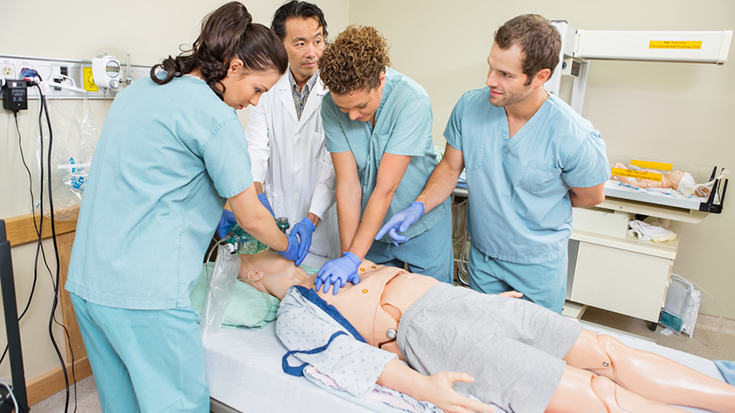
Educational needs in the respiratory care profession continue to increase and two schools have just announced new degree programs aimed at producing RT graduates who can rise to the next level.
Transitioning to the BS level
A goal nearly a decade in the making was realized at Molloy College on Long Island in New York earlier this month when CoARC approved the RT program’s request to transition to the BS level.
“We decided to upgrade to a BS as far back as 2008,” says Program Director Robert Tralongo, MBA, RRT-NPS, CPFT, AE-C. “The reasons included a need to increase the number of credits to give the students a more in-depth learning experience.”
Tralongo and his colleagues knew transitioning to the BS level would allow them to increase not only the number of respiratory courses they offered but also the number of general education courses students need to achieve a well-rounded education.
Student preferences were part of the mix as well. The AARC member notes many of those enrolled in the program over the years had expressed the desire to obtain a four-year BS degree instead of the two-year AAS.
It was not an easy task. “The approval process required the design of the program, the interaction within the college governance structure, budgeting, and physical need for laboratory space,” says Tralongo. Once the college was on board, he and his fellow faculty members had to go to the New York State Board of Regents and get them to sign off on the change as well.
The final step was the CoARC request for the substantive change approval, which was issued on May 16. The first class of BS RT students could enroll as early as the fall of 2018, with the first graduates walking across the stage by May of 2022.
Tralongo believes the transition to the BS level will elevate the stature of the RT degree offered at Molloy. “Although I always felt we provided excellent instruction to our students, we were not considered a professional program by many academic and medical disciplines. The BS degree gives us a higher standing in the medical profession.”
He credits his colleagues at Molloy for making it happen. “My colleagues did a great job, and I am proud of their work,” says the educator.
ASRT-to-MSRT
The respiratory therapy department at Weber State University (WSU) in Ogden, UT, has opened enrollment into a three-year ASRT-to-MSRT program for respiratory therapists who possess an AS degree in RT from a regionally accredited institution of higher learning and the RRT credential.
“It’s a bridge that should help practitioners with a way to decrease the time to earn a BS, with residency requirements for the degree on their way to post-professional MSRT,” says Paul Eberle, PhD, RRT, professor and chair of the department of respiratory care.
The program received approval from the Utah State Board of Regents in January of 2016 but had been in the works since about 2014. “Once it was approved by the Regents we proposed a way to promote higher learning and advance the profession to master’s prepared consultants, educators, and resources to physicians,” says Dr. Eberle.
The WSU President’s Council approved the program in March.
Students enrolled in the program will first complete hours to fulfill the requirements for a bachelor’s degree and then go on to complete the hours needed to achieve the master’s degree. The coursework can be completed online as well, giving working therapists a convenient way to earn an MSRT.
Dr. Eberle believes the program will graduate therapists who are capable of taking on the extended roles in the profession that are needed to meet the demands of our increasingly complex health care system.
“The idea is to promote practitioners with a way to grow personally and professionally in the profession,” says the AARC member. “It can enhance ‘evaluate and treat’ protocols for physicians that request RT expertise and practice at a higher level of care.”
The program is accepting applicants now, and students will be able to choose from three tracks: education, health administration, and research.
The AARC has complied an extensive set of resources for AS degree RT programs that would like to transition to the BS degree level, including a PowerPoint presentation on the value of transitioning to the BS level, a transition checklist for program directors, and a Q&A with two program directors who have already made the change.